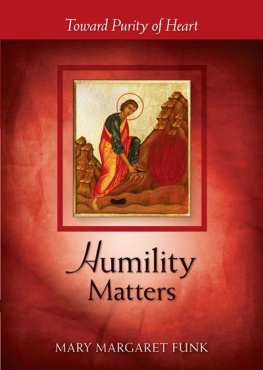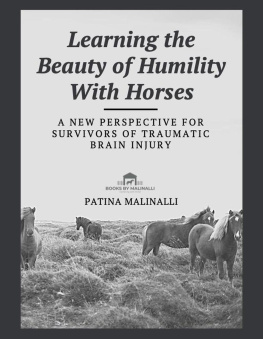Andrew Murray - Humility
Here you can read online Andrew Murray - Humility full text of the book (entire story) in english for free. Download pdf and epub, get meaning, cover and reviews about this ebook. year: 2013, publisher: Start Publishing LLC, genre: Religion. Description of the work, (preface) as well as reviews are available. Best literature library LitArk.com created for fans of good reading and offers a wide selection of genres:
Romance novel
Science fiction
Adventure
Detective
Science
History
Home and family
Prose
Art
Politics
Computer
Non-fiction
Religion
Business
Children
Humor
Choose a favorite category and find really read worthwhile books. Enjoy immersion in the world of imagination, feel the emotions of the characters or learn something new for yourself, make an fascinating discovery.
- Book:Humility
- Author:
- Publisher:Start Publishing LLC
- Genre:
- Year:2013
- Rating:4 / 5
- Favourites:Add to favourites
- Your mark:
- 80
- 1
- 2
- 3
- 4
- 5
Humility: summary, description and annotation
We offer to read an annotation, description, summary or preface (depends on what the author of the book "Humility" wrote himself). If you haven't found the necessary information about the book — write in the comments, we will try to find it.
Humility is the most overlooked teaching of Jesus Christ. In this book Andrew Murray explores how essential humility is to the understanding and practice of Christianity. Perhaps the best book ever written on the subject.
We have seen humility in the life of Christ, as He laid open His heart to us: let us listen to His teaching. There we shall hear how He speaks of it, and how far He expects men, and specially His disciples, to be humble as He was. -Andrew Murray
Humility — read online for free the complete book (whole text) full work
Below is the text of the book, divided by pages. System saving the place of the last page read, allows you to conveniently read the book "Humility" online for free, without having to search again every time where you left off. Put a bookmark, and you can go to the page where you finished reading at any time.
Font size:
Interval:
Bookmark:
There are three great motives that urge us to humility. It becomes me as a creature, as a sinner, as a saint. The first we see in the heavenly hosts, in unfallen man, in Jesus as Son of Man. The second appeals to us in our fallen state, and points out the only way through which we can return to our right place as creatures. In the third we have the mystery of grace, which teaches us that, as we lose ourselves in the overwhelming greatness of redeeming love, humility becomes to us the consummation of everlasting blessedness and adoration.
In our ordinary religious teaching, the second aspect has been too exclusively put in the foreground, so that some have even gone to the extreme of saying that we must keep sinning if we are indeed to keep humble. Others again have thought that the strength of self-condemnation is the secret of humility. And the Christian life has suffered loss, where believers have not been distinctly guided to see that, even in our relation as creatures, nothing is more natural and beautiful and blessed than to be nothing, that God may be all; or where it has not been made clear that it is not sin that humbles most, but grace, and that it is the soul, led through its sinfulness to be occupied with God in His wonderful glory as God, as Creator and Redeemer, that will truly take the lowest place before Him.
In these meditations I have, for more than one reason, almost exclusively directed attention to the humility that becomes us as creatures. It is not only that the connection between humility and sin is so abundantly set forth in all our religious teaching, but because I believe that for the fullness of the Christian life it is indispensable that prominence be given to the other aspect. If Jesus is indeed to be our example in His lowliness, we need to understand the principles in which it was rooted, and in which we find the common ground on which we stand with Him, and in which our likeness to Him is to be attained. If we are indeed to be humble, not only before God but towards men, if humility is to be our joy, we must see that it is not only the mark of shame, because of sin, but, apart from all sin, a being clothed upon with the very beauty and blessedness of heaven and of Jesus. We shall see that just as Jesus found His glory in taking the form of a servant, so when He said to us, Whosoever would be first among you, shall be your servant, He simply taught us the blessed truth that there is nothing so divine and heavenly as being the servant and helper of all. The faithful servant, who recognizes his position, finds a real pleasure in supplying the wants of the master or his guests. When we see that humility is something infinitely deeper than contrition, and accept it as our participation in the life of Jesus, we shall begin to learn that it is our true nobility, and that to prove it in being servants of all is the highest fulfillment of our destiny, as men created in the image of God.
When I look back upon my own religious experience, or round upon the Church of Christ in the world, I stand amazed at the thought of how little humility is sought after as the distinguishing feature of the discipleship of Jesus. In preaching and living, in the daily intercourse of the home and social life, in the more special fellowship with Christians, in the direction and performance of work for Christ,alas! how much proof there is that humility is not esteemed the cardinal virtue, the only root from which the graces can grow, the one indispensable condition of true fellowship with Jesus. That it should have been possible for men to say of those who claim to be seeking the higher holiness, that the profession has not been accompanied with increasing humility, is a loud call to all earnest Christians, however much or little truth there be in the charge, to prove that meekness and lowliness of heart are the chief mark by which they who follow the meek and lowly Lamb of God are to be known.
Start Publishing LLC
Copyright 2012 by Start Publishing LLC
All rights reserved, including the right to reproduce this book or portions thereof in any form whatsoever.
First Start Publishing eBook edition October 2012
Start Publishing is a registered trademark of Start Publishing LLC
Manufactured in the United States of America
10 9 8 7 6 5 4 3 2 1
ISBN 978-1-62558-760-2
by Andrew Murray
They shall cast their crowns before the throne, so saying: Worthy art Thou, our Lord and our God, to receive the glory, and the honor and the power: for Thou didst create all things, and because of Thy will then are, and were created. Rev. 4:11
When God created the universe, it was with the one object of making the creature partaker of His perfection and blessedness, and so showing forth in it the glory of His love and wisdom and power. God wished to reveal Himself in and through created beings by communicating to them as much of His own goodness and glory as they were capable of receiving. But this communication was not a giving to the creature something which it could possess in itself, a certain life or goodness, of which it had the charge and disposal. By no means. But as God is the ever-living, ever-present, ever-acting One, who upholdeth all things by the word of His power, and in whom all things exist, the relation of the creature to God could only be one of unceasing, absolute, universal dependence. As truly as God by His power once created, so truly by that same power must God every moment maintain. The creature has not only to look back to the origin and first beginning of existence, and acknowledge that it there owes everything to God; its chief care, its highest virtue, its only happiness, now and through all eternity, is to present itself an empty vessel, in which God can dwell and manifest His power and goodness.
The life God bestows is imparted not once for all, but each moment continuously, by the unceasing operation of His mighty power. Humility, the place of entire dependence on God, is, from the very nature of things, the first duty and the highest virtue of the creature, and the root of every virtue.
And so pride, or the loss of this humility, is the root of every sin and evil. It was when the now fallen angels began to look upon themselves with self-complacency that they were led to disobedience, and were cast down from the light of heaven into outer darkness. Even so it was, when the serpent breathed the poison of his pride, the desire to be as God, into the hearts of our first parents, that they too fell from their high estate into all the wretchedness in which man is now sunk. In heaven and earth, pride, self-exaltation, is the gate and the birth, and the curse, of hell. (See Note A at end of chapter.)
Hence it follows that nothing can be our redemption, but the restoration of the lost humility, the original and only true relation of the creature to its God. And so Jesus came to bring humility back to earth, to make us partakers of it, and by it to save us. In heaven He humbled Himself to become man. The humility we see in Him possessed Him in heaven; it brought Him, He brought it, from there. Here on earth He humbled Himself, and became obedient unto death; His humility gave His death its value, and so became our redemption. And now the salvation He imparts is nothing less and nothing else than a communication of His own life and death, His own disposition and spirit, His own humility, as the ground and root of His relation to God and His redeeming work. Jesus Christ took the place and fulfilled the destiny of man, as a creature, by His life of perfect humility. His humility is our salvation. His salvation is our humility.
And so the life of the saved ones, of the saints, must needs bear this stamp of deliverance from sin, and full restoration to their original state; their whole relation to God and man marked by an all-pervading humility. Without this there can be no true abiding in Gods presence, or experience of His favor and the power of His Spirit; without this no abiding faith, or love or joy or strength. Humility is the only soil in which the graces root; the lack of humility is the sufficient explanation of every defect and failure. Humility is not so much a grace or virtue along with others; it is the root of all, because it alone takes the right attitude before God, and allows Him as God to do all.
Font size:
Interval:
Bookmark:
Similar books «Humility»
Look at similar books to Humility. We have selected literature similar in name and meaning in the hope of providing readers with more options to find new, interesting, not yet read works.
Discussion, reviews of the book Humility and just readers' own opinions. Leave your comments, write what you think about the work, its meaning or the main characters. Specify what exactly you liked and what you didn't like, and why you think so.















